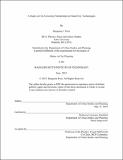A study on city-university partnerships for smart city technologies
Author(s)
Preis, Benjamin J.(Benjamin Joshua)
Download1140203927-MIT.pdf (2.807Mb)
Other Contributors
Massachusetts Institute of Technology. Department of Urban Studies and Planning.
Advisor
Lawrence Susskind.
Terms of use
Metadata
Show full item recordAbstract
On September 14, 2015, the Obama Administration announced its Smart Cities Initiative, a $160 million investment in a range of research and development activities focused on "Smart Cities." The MetroLab Network, a consortium of partnerships involving cities and their universities, was announced as part of the Initiative. In order to join the Network, university-city partners had to agree to follow a set of rules and procedures to govern their partnership. This research explores the history, governance, goals, and outcomes of two such partnerships: Carnegie Mellon University and Pittsburgh, PA and the University of Chicago, and Chicago, IL. Although these two partnerships work under the same MetroLab Network umbrella, the type and breadth of the activities each university undertook on behalf of their city partner varied greatly. The structure of the partnerships, project selection; deliverables and outcomes; data sharing and data ownership; levels and forms of community engagement; funding; technology transfer; and engagement with and impact of MetroLab were quite different in the two cases. Levels of satisfaction among the city partners, commitments to protect citizens' rights, and the level of control granted to each of the partners varied markedly. These two cases are presented in the context of the history of city-university partnerships, university-community partnerships and the emergence of interest in Smart Cities in the United States. The thesis offers seven recommendations for MetroLab, cities, and universities involved in this type of research moving forward: 1) formalize expectations for every project; 2) Negotiate with funders to prioritize local needs; 3) Mitigate negative impacts of experiments; 4) Develop expertise and allies throughout city government; 5) Seek involvement throughout the university; 6) Engage citizens in the partnership, not just the projects; and 7) Develop revenue sharing agreements for projects that commercialize.
Description
This electronic version was submitted by the student author. The certified thesis is available in the Institute Archives and Special Collections. Thesis: M.C.P., Massachusetts Institute of Technology, Department of Urban Studies and Planning, 2019 Cataloged from student-submitted PDF version of thesis. Includes bibliographical references (pages 115-125).
Date issued
2019Department
Massachusetts Institute of Technology. Department of Urban Studies and PlanningPublisher
Massachusetts Institute of Technology
Keywords
Urban Studies and Planning.